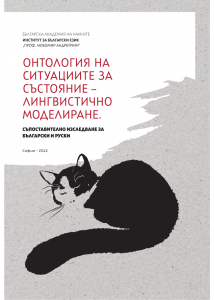Предикаты желания в болгарском языке в сопоставлении с русским
Predicates of volition in the Bulgarian language in contrast
with Russian
Author(s): Elena Yu. Ivanova
Subject(s): Language studies, Language and Literature Studies, Theoretical Linguistics, Applied Linguistics, Syntax, Lexis, Semantics, Comparative Linguistics, Cognitive linguistics, Descriptive linguistics, Eastern Slavic Languages, South Slavic Languages, Translation Studies
Published by: Институт за български език „Проф. Любомир Андрейчин“, Българска академия на науките
Keywords: predicates of volition; dispositional (“feel-like”) constructions; reflexive dative constructions; uncontrollability; impersonality; translation
Summary/Abstract: This paper discusses the basic means of expressing desire in the Bulgarian language in comparison with Russian. The main focus is on the Bulgarian dispositional constructions, e.g. (Танцува ми се; не ми се прибира (I feel like dancing, I do not want to go home), which do not have a direct equivalent in Russian. The specific structure of the Bulgarian dispositional constructions is analyzed against the background of the lexical means of expressing desire: both by personal and by impersonal verbs. On the basis of evidence from parallel corpora, I show how the lack of exact correspondences between the two languages is overcome in translation. Another important task of the study is to reveal the semantic and grammatical differences between the Bulgarian dispositional constructions and the reflexive-dative Russian model (Мне (не) работается (I do not feel like working), which expresses a state of predisposition to an action. I demonstrate that the two constructions in focus, although similar at first glance, have significant grammatical and semantic differences. The analysis of parallel texts suggests that both constructions do not have a direct translation equivalent in the target language, and that the Russian model does not even have a regular translation correspondence.
- Page Range: 427-457
- Page Count: 31
- Publication Year: 2022
- Language: Russian
- Content File-PDF

